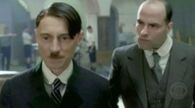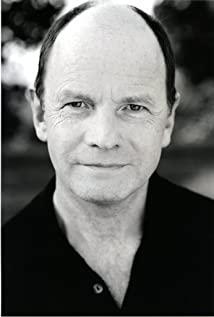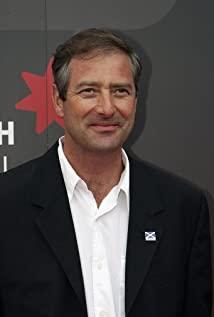"There is one thing, and only this, which is permanent, which existed before the world, and will exist in the organization of the world itself: it is justice. "
But in the face of the evil dormant in the face of justice, Burke warned: "As long as good people stand by and watch, evil will triumph." This is the film "Hitler: The Rise of Evil" describing the rise of Hitler. The origin of the first appearance of "the only condition for the victory of the wicked is for the good to stand by".
January 30, 1933, when "the 43-year-old man with the Charlie Chaplin beard, the young tramp who did nothing in Vienna, who was a nobody in World War I" , the hapless man who went unnoticed in Munich in those first bleak days after the war, the somewhat comical leader of the beer hall coup, the demagogue who was not German at all but Austrian" Hitler was sworn in as Chancellor of Germany Afterwards, he "stands in front of an open window of the Chancellery, ecstatic, dancing, constantly raising his arms in the Nazi salute, smiling and laughing, his eyes filled with tears of joy."
It was an evil success and a righteous fiasco.
Under the torches held high by the Nazi stormtroopers, in the powerful rhythm of the boots, in the sky-shattering military music and singing, not only the ordinary German people on the road were cheering, but even the German national hero Marshal Hindenburg was also very excited. . At that moment, almost all Germans were looking forward to a revival, because at the pinnacle of power was a Nietzsche-prophesied "superman" who was not an angel, but "a diabolical, granite Will, unbelievable instinct, ruthless ruthlessness, brilliant intellect, wild whims, and astonishing ability to judge people and situations. Only in the end, when dazzled by power and victory, did he do things beyond his own power.” incarnation of Satan.
For sixty years, attempts have been made to unravel the mystery of Hitler's success. Why would a great nation that gave birth to Leibniz, Kant, Heder, Humboldt, Lessing, Goethe, Schiller, Bach and Beethoven choose a demon as its leader? And how did this demon reach the pinnacle of power step by step? How unbelievable this is in the eyes of future generations!
In 2003, CBS in the United States funded the filming of the "TV movie" Hitler: The Rise of Evil, trying to recreate that dark time in German history through the camera and find the answer from it.
After the film was broadcast, it immediately won seven Emmy nominations that year, and finally won two awards for best art direction and best sound editing in 2003. But unfortunately, this is an American-style film after all. Although the film tries to restore the truth of history, due to the deviation in the understanding of history and characters, the whole film has a very light German flavor, but it is eye-catching from beginning to end. Has a prominent US label.
Hitler was born in the small town of Braunau on the River Inn, his father was Hitler's mother's cousin, this is a historical fact, but for some reason, the film changed his parents' relationship to uncle and niece. If it was a typo in language translation, then Hitler's father died of a pulmonary hemorrhage on an early morning walk was filmed as his sudden death at home in front of his son and wife, which is an absolute distortion of history.
If it is said that the film's arrangement is intentional, what is the intention of doing so?
Even if the choreographer tried to apply Freud's theory and tried to find the cause of Hitler's distorted personality in adulthood from his childhood experiences, it should give due respect to history, and should find it from the truth, rather than falsify and fabricate it.
According to reports, Hindenburg was happy when he saw the Nazi party's celebration parade, but the film bluntly tampered with such an important history as that the faint-hearted old man was worried about the future of Germany and Zhang Xian of the powerful Nazis. Shocked. The art of fabrication is acceptable for entertainment. As a serious film that reveals historical themes, the above two plots are definitely not enough. This is exactly the expression of the randomness of American films!
As Hitler's "the saddest period in his life" for 4 years in Vienna, "Hitler: The Rise of Evil" was only passed in a hurry, and this is precisely the most valuable excavation of the formation of Hitler's worldview.
Hitler once said in Mein Kampf that he learned everything he needed to know from his life among the poor in Vienna.
"Vienna was, and still is, the most difficult school of my life, albeit the most thorough one. I entered the city as a child, and left as an adult with a calm and serious character. "During this period, I formed a worldview, a philosophy of life, which later became the solid foundation of all my actions. Apart from the foundation I laid at that time, I rarely needed to learn anything later, nor did I need to Change something."
It was his experience of wandering in Vienna that allowed him to endure the filth of the front lines of World War I, and the lice, mud and stench without complaining, a unique quality of his successful political career.
It was also in Vienna that Hitler became a staunch anti-Semitic, which brought endless disasters to the Jews of Europe and the world in the future.
Still in Vienna, Hitler turned from art to politics, poring over the success of the Social Democratic Party and summarizing the idea of building a mass movement, mastering the art of propaganda among the masses, and exploiting what he called "mental and physical terror." "The value of ", and the important realization that to hold power, we must obtain the support of powerful departments such as the church, the army, the cabinet or the head of state.
Still in Vienna, Hitler, who was shy in the past, discovered the magical power of speech and began to try to speak in public. After years of tempering, he finally achieved the most provocative eloquence and speech that shocked the world in the future.
It is a pity that "Hitler: The Rise of Evil" is unremittingly shoveling such a rich mine, which is definitely a major mistake of the film director.
As for historical events such as the highly dramatic "beer hall coup", the film did not give enough space to focus on it.
Compared with Hitler's political propositions and means of reaching the top, the film director seems to be more interested in Hitler's personality, so a lot of Hitler's emotional life plots are arranged in the film: Hitler and Gilly's uncle and nephew, and Hanfstein Mrs. Garr's pursuit, and the encounter with Eva, etc. It's a pity that the director simply made Hitler's face, so that all of these scenes unmistakably instill in the audience the idea that Hitler had a perverted personality, a hysterical psychopath, a tremor sufferer, and a short-sighted villain. Such a simplistic performance is perfectly implemented in the actor Albert, but the more it does, the more the film deviates from the direction of historical film.
For such a film, I really don't know where it should be classified: a historical film, there are too many plots in the film that are inconsistent with history; a commercial film, the theme of the film is too heavy, it seems that the film is recommended in Chinese The "TV movie" titled at the time is a compromise, but what is a "TV movie"? How to interpret this concept?
It's a pity that such a good material was screwed up by a few crappy directors.
View more about Hitler: The Rise of Evil reviews











